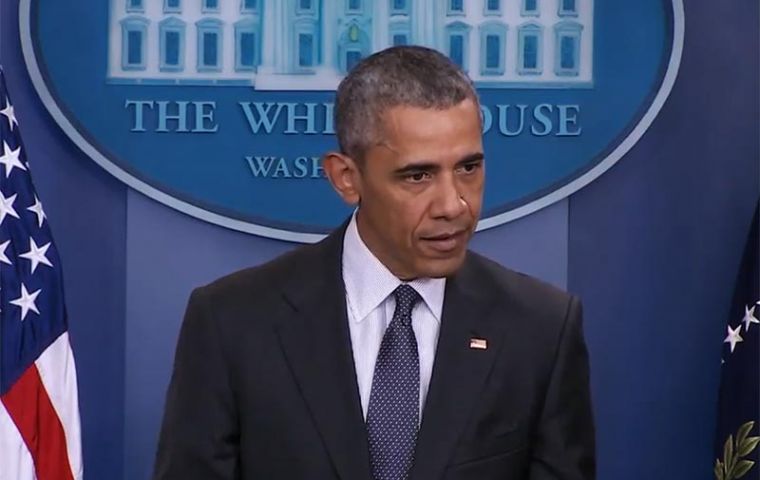MercoPress. South Atlantic News Agency
Obama on Panama Papers: “a lot of it is legal, but that's exactly the problem”
 “A lot of it is legal, but that’s exactly the problem. It’s not that they’re breaking the laws, it’s that the laws are so poorly designed.”
“A lot of it is legal, but that’s exactly the problem. It’s not that they’re breaking the laws, it’s that the laws are so poorly designed.” United States President Obama hailed new Treasury Department rules cracking down on corporate tax inversions Tuesday, calling the practice of merging with a foreign company to escape U.S. taxes “one of the most insidious tax loopholes out there.”
Highlighting the actions his administration is taking on overseas tax avoidance, Obama also made a connection to widespread revelations of tax evasion, money laundering and sanctions violations in the recently released Panama Papers.
“We've had another reminder in this big dump of data coming out of Panama that tax avoidance is a big, global problem. It’s not unique to other countries,” Obama said. “A lot of it is legal, but that’s exactly the problem. It’s not that they’re breaking the laws, it’s that the laws are so poorly designed.”
Corporations who can afford the accountants and lawyers to arrange the tax deals are “gaming the system,” he said.
Obama called on Congress to overhaul the corporate tax system, saying the abuse of tax breaks was costing middle-class families.
“When companies exploit loopholes like this, it makes it harder to invest in the things that are going to make the American economy strong for generations to come. It sticks the rest of us with the tab, and it makes hardworking Americans feel like the deck is stacked against them,” he said.
The Treasury Department on Monday announced the latest in a series of new regulations designed to restrict the inversions, in which a U.S. company agrees to be acquired by a foreign company simply to avoid paying the higher corporate income tax rate in the United States. ”They effectively renounce their citizenship. They declare that they're based somewhere else,” Obama said.
Companies looking to invert their tax residence often do so in order to get away from the 35% corporate tax rate in the US. In countries like the UK and Ireland, the rate is 20% and 12%, respectively.
Treasury has taken action twice to make it harder for companies to invert. These actions took away some of the economic benefits of inverting and helped slow the pace of these transactions, but we know companies will continue to seek new and creative ways to relocate their tax residence to avoid paying taxes here at home,” said Treasury Secretary Jacob Lew in a statement.
Though the Treasury did not specify any corporate inversions in its rules, many analysts see the potential merger between drug company Pfizer and Allergan as a primary target. Pfizer is looking to buy Allergan and move its tax residence to Ireland later this year.
The move would save Pfizer some US$35 billion in taxes and be the largest corporate inversion ever.
Pfizer did not comment on the rules except to say it is reviewing them.
Another rule proposed by the US Treasury would target corporate “earnings stripping,” in which businesses accept loans from their foreign parent companies in order to pay fewer taxes on profits from the US. By making interest payments on those loans, companies can deduct that money from its taxable income.
These actions would “further rein in inversions and reduce the ability of companies to avoid taxes,” Lew said, but he added that inversions can’t be fully stopped unless Congress takes action. President Obama has repeatedly called on lawmakers to do so, but so far the GOP-controlled Congress has not passed the appropriate legislation.
Already, the Organization for International Investment group, which lobbies for foreign companies, has come out against the regulations.
“Treasury’s action would increase the cost of investing and expanding across the United States for all foreign companies and put at risk more than 12 million American workers that are supported by foreign direct investment in the United States,” Nancy McLemon, the group's chief executive, said in a statement.
According to the Treasury, 23 inversions have occurred since 2012, significantly more than the three total in 2010 and 2011.




Top Comments
Disclaimer & comment rules-

Read all commentsYes!
Apr 07th, 2016 - 03:01 am 0I saw President Obama say this and I cheered.
For context see: https://theintercept.com/2016/04/04/a-key-similarity-between-snowden-leak-and-panamapapers-scandal-is-whats-been-legalized/
Commenting for this story is now closed.
If you have a Facebook account, become a fan and comment on our Facebook Page!